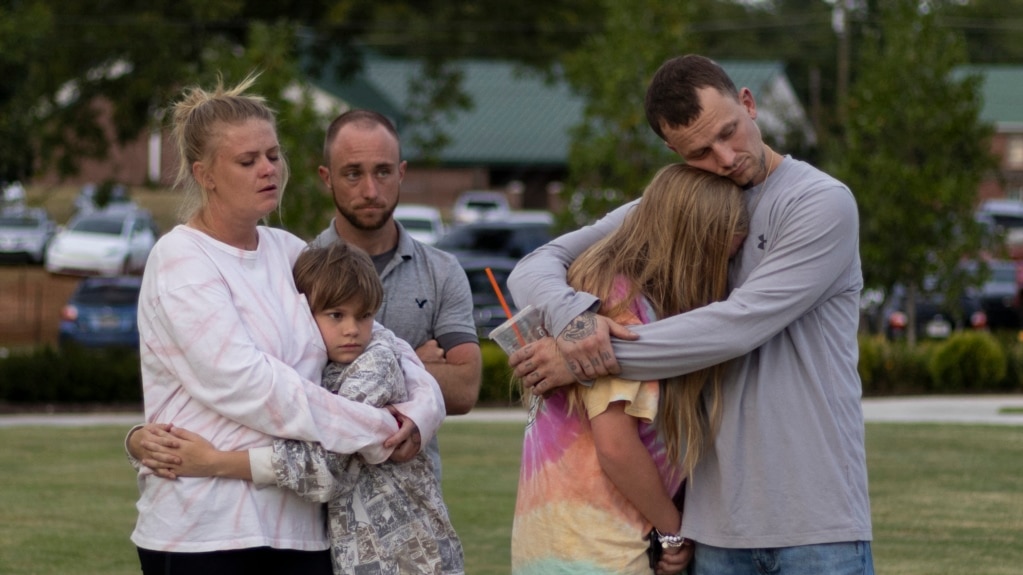A mass shooting at an American high school has raised questions about policies restricting cellphone use in classrooms.
The shooting took place September 4 at Apalachee High School in the southern state of Georgia. The suspect was identified as Colt Gray, a 14-year-old student at the school. The shooting left two students and two teachers dead. Nine others were injured.
During the shooting, some students at Apalachee High School used cellphones to call their parents to let them know what was happening. Others made calls to loved ones to leave messages they thought might end up being final goodbyes.
Some opponents of cellphone bans in schools have said such situations demonstrate a reason cellphones should not be completely banned from classrooms. They believe phone bans can cut off a possible lifeline for parents to make sure their children are safe during school shootings or other emergencies.
But supporters of such restrictions – including many teachers – say the rules are needed. They say cellphones can cause many distractions for students.
Keri Rodrigues is president of the National Parents Union, an education activist group. She said she understands that parents “are deeply concerned about whether or not they're going to get timely information” about their kids in emergency situations.
Rodrigues told The Associated Press (AP), “The fact of the matter is parents and families cannot rely on schools to effectively communicate with us in times of emergency, and this has happened time and again.”
Nationwide, 77 percent of U.S. schools say they currently ban cellphones for non-school-related work. That number comes from the National Center for Education Statistics. But experts say the number is misleading and does not necessarily mean students are following the bans or that all schools are effectively enforcing them.
In the southern state of Arkansas, Republican Governor Sarah Huckabee Sanders offered school districts a state-supported financial assistance program. It helps administrators buy containers to hold students’ phones during the school day.
In California, Democratic Governor Gavin Newsom has urged school districts to restrict cellphone use. He is considering signing legislation that would require schools to enact restrictions.
Newsom recently told reporters, “I’d hate to see another school shooting be the reason that we bring TVs into the classroom and then disrupt our children’s education.” He explained that permitting schoolchildren to have cellphones in school is almost like letting them watch television in class. Doing so, Newsom said, can “greatly disrupt” the learning process.
But opponents of phone bans say the device can be helpful for students facing dangerous situations at school. For example, some students caught in the Apalachee shooting were able to use their phones to contact loved ones during moments they feared could be their last.
One student, high school junior Julie Sandoval, told the AP she texted her mother from inside the school, “I love you. I love you so much…” In another message, she wrote, “I’m sorry I’m not the best daughter. I love you.”
Sandoval said she heard another student during the shooting speaking with her mother on the phone. She was heard saying, “They’re shooting up the school! They’re shooting up the school!”
But some supporters of phone restrictions warn that permitting students to use phones during shootings or other emergencies could put them in even more danger.
Kim Whitman is co-founder of the Phone-Free Schools Movement. The group supports school policies to keep cellphones out of students’ hands during class. “What’s even more important to me is their safety,” Whitman said. She noted, for example, that a child on the phone with a loved one during a school emergency might miss important guidance from teachers or school officials. “That’s a worse scenario in my mind,” Whitman added.
Students in other school shootings have used cellphones to inform school officials or parents about the incidents. During the 2022 school shooting in Uvalde, Texas – which killed 21 people – a fourth-grader called 911 to get help. And during a 2018 shooting at Florida’s Marjory Stoneman Douglas High School, students used their phones to communicate with loved ones and shoot video of the shooting.
I’m Bryan Lynn.

